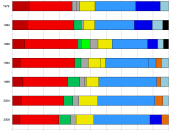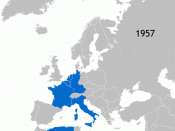The onset of European integration is rooted in the 1951 Treaty of Paris, which following thirty years of destruction on European soil, was a profound reaction to any future brutality that might threaten the desire for peaceful co-existence amongst European countries. It was the establishment of the European Coal and Steel Community in 1951 with six European countries - France, West Germany, Italy, Belgium, Luxembourg and the Netherlands - to foster the first full customs union that would serve as the foundation for the eventual development and progression of the European Union. The new European environment which sharply defied the prevailing Westphalian state model based on territoriality and autonomy sought to engage states in an "international contractual arrangement that establishes authority structures superseding territorial boundaries and transgressing autonomy". The system of political and economic integration has been an essential element in maintaining mostly peaceful relations in Europe for the past fifty years.
However, as the EU has continued to enlarge and its borders have now extended beyond the European continent, the question of stability and security in and around the immediate neighbourhood has become a topic of great debate.
The end of the Cold War created new possibilities yet posed many challenges for an ideologically divided Europe; the break-up of the Soviet Union not only signified an opportunity for the unification of Europe, but it also meant the eventual incorporation of newly liberated Communist states into the European Union's realm of liberty, security, prosperity and social democracy. As the European Security Cooperation (ESC) was superseded by the Common Foreign Security Policy (CFSP) in the Maastricht Treaty in 1993, the need for a comprehensive and coherent foreign and security policy to meet the requirements of a new European environment was evident. Where stands the reason, however, for "neglecting" the Defence and...


